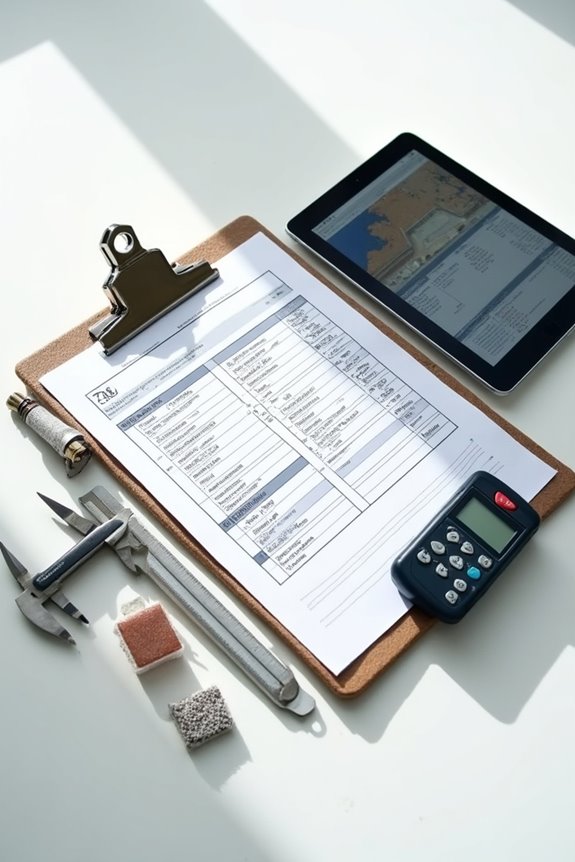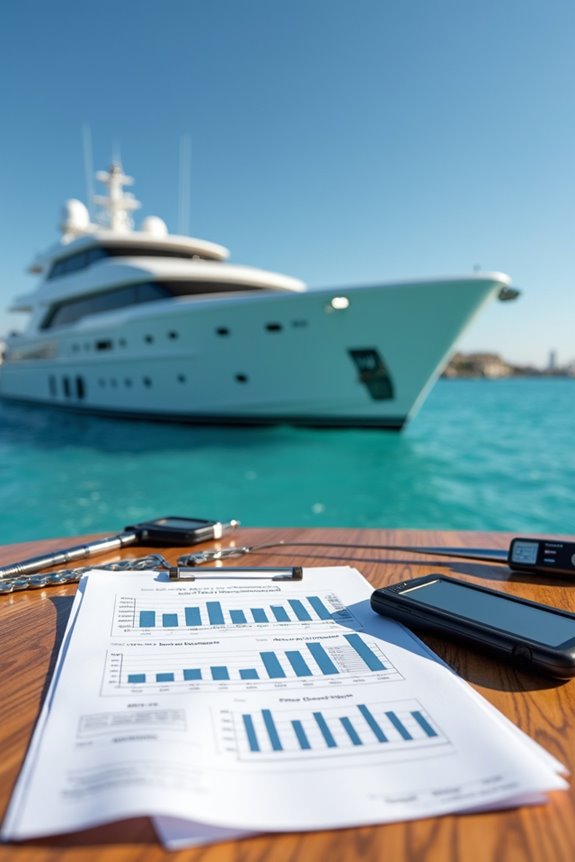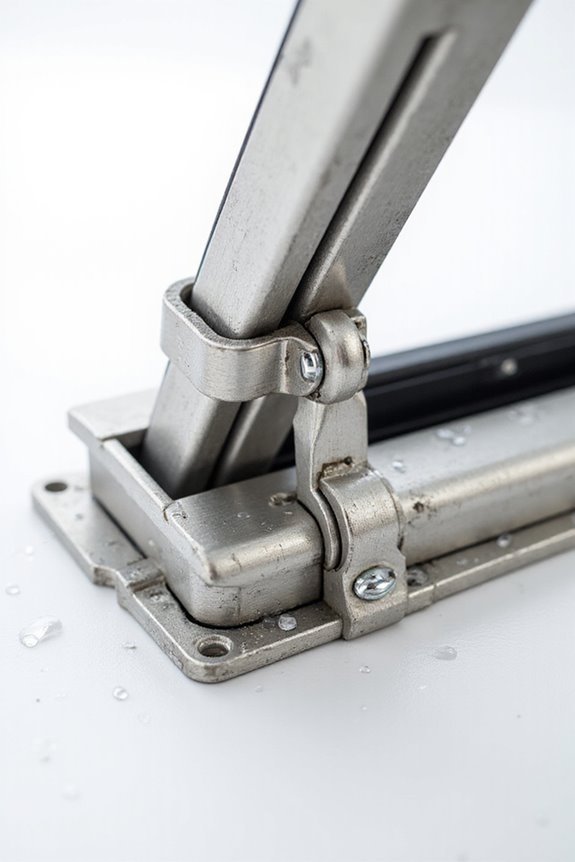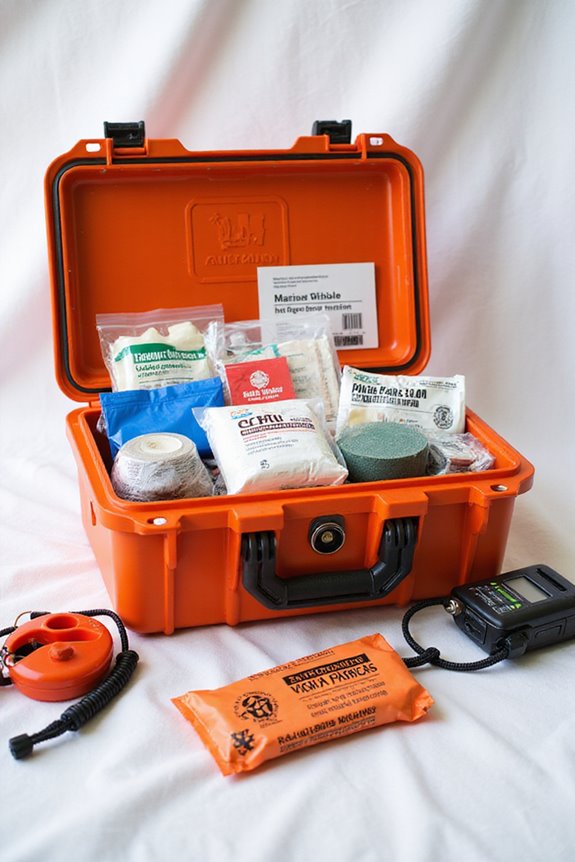When figuring out a yacht’s value, we blend several approaches like comparing recent sales, checking out the type—racing, luxury, or commercial—and considering replacement costs along with depreciation. Market trends also play a part, shaping prices and buyer tastes. We don’t just guess; professional surveys and valuation tools help keep things honest and clear. Curious how tech upgrades or trend shifts tweak those numbers? Stick around, and we’ll unpack those details together.
Key Takeaways
- Yacht valuation methods include comparative analysis, income evaluation, and cost-to-replace approaches to determine realistic market value.
- Different yacht types (racing, luxury, commercial) require tailored valuation criteria based on performance, amenities, or income potential.
- Market trends and recent comparable sales significantly influence yacht valuations and pricing strategies.
- Cost-based approaches assess value by considering replacement expense and depreciation factors such as wear, obsolescence, and market changes.
- Professional marine surveyors and valuation tools provide accurate assessments, combining expert insight with market data to ensure fair pricing.
Key Techniques for Determining Yacht Value
Although yacht valuation might sound complex, there are some key techniques that help us figure out what a yacht is really worth. One common method is comparative analysis, where we look at recent sales of similar yachts to get a realistic value range. Think of it like checking out the neighborhood before deciding on a house price. Another approach is income evaluation, especially helpful if the yacht is used for chartering—here, we estimate future earnings to determine its value. Of course, sometimes we consider the cost to replace or reproduce the yacht, but these first two give a great starting point. Together, they guarantee we’re grounded in real data, not just wishful thinking. So, when you’re curious about value, these techniques keep us honest and informed.
Impact of Yacht Type on Valuation Methods

We’ve covered some solid ways to figure out a yacht’s value, but here’s the thing: not all yachts are created equal, and their type really changes the game. Yacht classifications—from sleek racing vessels to sprawling luxury cruisers—come with different valuation criteria. For instance, racing yachts focus heavily on performance specs, while luxury yachts’ value often hinges on interior design and onboard amenities. Commercial yachts, like charter boats, bring another twist, as their income potential heavily influences their worth. Size, layout, maintenance, and custom upgrades all play roles too. So, when you’re sizing up a yacht’s value, knowing its type helps us pick the right criteria and avoid comparing apples to… well, yachts. It’s like finding the right key for a very fancy lock.
Influence of Market Trends and Comparable Sales

Since the yacht market is always shifting, understanding how current market trends and comparable sales influence valuation is key to getting a realistic picture. Market dynamics reveal a steady growth, with more yachts sold recently—even if prices slightly dipped from $11.7M to $10.7M. Our sales analysis shows sellers increasingly price their yachts right the first time, cutting down on price drops. But here’s a twist: yachts are staying on the market longer, suggesting buyers are a bit pickier, which affects comparable sales values. So, when we look at valuation, it’s not just about numbers—it’s about reading the mood of the market. After all, what’s a price tag if it doesn’t reflect what buyers really want these days?
Assessing Yachts Through Cost-Based Approaches

When it comes to valuing yachts, the cost-based approach gives us a straightforward angle to contemplate — basically, what it would take to replace the vessel today, minus a few marks for wear and tear. We carefully consider depreciation factors like physical deterioration, functional obsolescence (think outdated tech), and even economic shifts impacting value. But, let’s be honest, valuation challenges pop up, especially when quantifying these depreciation types or tracking fluctuating market conditions. It’s not just about the yacht’s age or condition; we also factor in regulatory updates and technological advances that might make a newer model more appealing. So, while this method feels solid and logical, it still requires some detective work — which is part of what makes yacht valuation such an intriguing puzzle to solve together.
Utilizing Professional Services and Valuation Tools

Figuring out a yacht’s value on our own can sometimes feel like trying to solve a riddle without all the clues. Luckily, we don’t have to go it alone—professional services and valuation tools are here to help. Marine surveyors, for instance, play a key role by thoroughly inspecting yachts to guarantee valuation accuracy. But we can also rely on trusted guides like the NADA Marine Appraisal Guide or Blue Book Boat Values, which offer detailed data and market comparisons. Ever used one of those online valuation platforms? They give instant insights based on make, model, and year. By combining expert assessments with these tools, we guarantee fair pricing and avoid surprises—because, honestly, who wants a yacht valuation mystery? Together, we’ll navigate these waters with confidence.
Frequently Asked Questions
How Often Should Yacht Valuations Be Updated?
They say, “A stitch in time saves nine.” We believe updating yacht valuations every 2–5 years, or with market fluctuations, keeps valuation frequency aligned with reality, helping us all stay informed and connected in this dynamic market.
Can Yacht Insurance Impact Valuation Methods?
It is understood that insurance coverage shapes appraisal accuracy since it demands specific valuation methods to set fair premiums and guarantee proper protection. Together, we can appreciate how insurance influences yacht valuations and keeps them aligned with actual value.
What Legal Factors Affect Yacht Valuation?
They say, “the devil’s in the details,” and when it comes to yacht valuation, maritime laws and ownership documentation really matter. Together, they protect us, ensuring clear title and legal compliance that boost confidence and value.
How Do International Regulations Influence Yacht Appraisals?
We understand international regulations shape yacht appraisals by ensuring regulatory compliance and adherence to international standards. Together, these create transparency and consistency, helping us value yachts fairly, despite the complexities in global markets, so we all feel confident.
Are Environmental Conditions Considered in Yacht Valuations?
We can’t ignore that marine ecosystems massively sway yacht values now. As more of us embrace eco-consciousness, market demand shifts—valuing sustainability. Together, we’re shaping valuations that honor our planet and create belonging in the yachting community.





